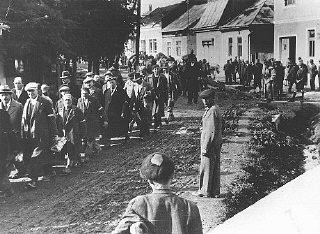Crap, the forum ate my reply. Alright I'll have to redo a shorter version.
I'm explaining the causes that have been left out of the standard narrative in response to a specific question about the role of food motivating the Holocaust. That doesn't mean Nazi racism didn't play a role, but if it were the sole motivating cause they would have immediately genocided the 3 million Polish Jews in 1939 rather than waiting until 1942. So clearly Nazi racism or general evilness wasn't the main motivating cause, otherwise why wait until after invading the USSR?
Which is false, because 3 million Polish Jews were in German hands as of 1939, but they weren't targeted for extermination until 1942. Prior to that point the main cause of death of Polish Jews was starvation or illness related to starvation.
As I've already provided the sources for even the Einsatzgruppen massacres of 1941 were linked to the food shortages that existed before the invasion (the invasion itself was predicated on seizing food, among other resources, per Hitler's own words). The standard narrative about racism being the main driver of the murders doesn't hold up given the timeline of events; all it explains is who was targeted for murder. The main driver of the planned massacres was the shortage of food:
That's the thing, the Jews rounded up were divided into those who were economically useful and those who weren't. By 1944 the only remaining Jews outside of Nazi control were those of Hungary and Romania who still had economic resources which were stolen and used to pay for the war, while Jews who could be worked were sent to camps to act as labor. Everyone else deemed useless was killed in some fashion because food didn't exist to feed them. That meant ultimately that the Holocaust turned a profit for the Nazis, as it got them labor, killed people who weren't deemed useful and didn't then need to be fed, and of course meant all their accumulated resources were available for plunder.
Hungarian Jews were robbed, which was profitable, sent to work if they could, which was profitable as the Germans badly needed labor as they were out of their own men, and removed those who couldn't work who now didn't need to be fed so there was more food for others. It is an horrific logic, but is utilitarianism taken to the extreme.






/pic2074726.png)